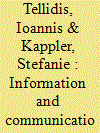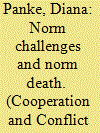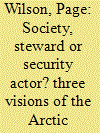|
|
|
Sort Order |
|
|
|
Items / Page
|
|
|
|
|
|
|
| Srl | Item |
| 1 |
ID:
143342


|
|
|
|
|
| Summary/Abstract |
Despite the volume of research exploring the use of information and communication technologies (ICTs) for destructive purposes (terrorism, crime, war propaganda) on the one hand, and development (ICT4D) on the other hand, very little has been said about the role that traditional, and especially new social media, can play for the transformation and prevention of conflicts. This paper recognises ICTs as a tool, thus accepting their multi-level and multi-dimensional potential in the transformation as well as the intransigence and promotion of conflict. The paper seeks to explore: (a) whether ICTs can empower marginalised actors to transcend the peacebuilding and statebuilding processes, and lead to a more locally-owned, more representative transformation of the conflict; (b) whether ICTs can foster more hybrid forms of peace; and (c) whether they can be co-opted as a platform by donors to promote their agendas and impede resistance.
|
|
|
|
|
|
|
|
|
|
|
|
|
|
|
|
| 2 |
ID:
143340


|
|
|
|
|
| Summary/Abstract |
That the Lisbon Treaty lays the foundation for a supranational asylum and immigration policy is surprising, even more so for Liberal Intergovernmentalism (LI), whose founder Andrew Moravcsik predicts that no such development will take place. While the article uses LI as its point of departure, it shows that it runs into problems with regards to the policy area of asylum and immigration. The article therefore turns to the (neo-)functionalist concept of spillover. While working with the concept, it was deemed necessary to create a more coherent typology of different spillovers. The article suggests that the concept of spillover may be both descriptive and explanatory. With regards to descriptive spillover, it seems valuable to differentiate between widening and deepening spillovers, but concerning explanatory spillovers, more options became visible: there are unintended or intended functional spillovers, as well as unintended political, cultivated and social spillovers. The argument is illustrated through a detailed study of Sweden – a ‘reluctant European’ that within the area of asylum and immigration made a fundamental U-turn with regards to a supranationalism, a change that can be described as a social spillover.
|
|
|
|
|
|
|
|
|
|
|
|
|
|
|
|
| 3 |
ID:
143338


|
|
|
|
|
| Summary/Abstract |
The subject of a formerly strong norm’s death is not often in the limelight of political science research. This paper investigates successful norm challenges and analyses the conditions that lead to the abolition of norms rather than to limitations of the norms. It presents a theoretical account of norm challenges and develops hypotheses on mechanisms, success and outcomes. Six illustrative case studies show that norm contestations take place through non-compliance when norms are not embedded in international negotiation systems, while norm contestations through negotiation are frequently the case if norms are embedded in international regimes or organizations. Irrespective of the institutional context, the strength of norm challengers relative to norm proponents impacts the prospects for successful normative change. If norm challengers are stronger than the actors defending the status quo, the outcome of norm challenges is influenced by the combination of norm precision and the stability of the normative environment. If the broader context undergoes change while the contested norm is precise, norms cannot be reinterpreted to accommodate norm change. As a result, in such instances, norms die. By contrast, vague norms in combination with stable environments are not abolished after being subject to strong challenges, but are merely reinterpreted in a manner delimiting their applicatory scope.
|
|
|
|
|
|
|
|
|
|
|
|
|
|
|
|
| 4 |
ID:
143339


|
|
|
|
|
| Summary/Abstract |
This paper critically examines the discursive power of the International Criminal Court (ICC), which was established in 2002 with unprecedented jurisdiction in terms of both crimes being prosecuted and territorial scope. What evokes a critical engagement is not only the criminalization of certain acts in international law, but also the evolution of a permanent international criminal court with forms of power enabling the sanctioning, prosecution and punishment of these acts. Analysing how current international criminal law developed and is being shaped brings to the surface particular power structures embedded in legal texts and practices. By subjecting the discourse of the ICC to a Foucauldian analysis and arguing for the utility of Foucault’s concepts in analysing contemporary international criminal legal discourse, the paper contributes to our understanding of novel techniques and procedures of contemporary global governmentality, and how the ‘international community’ is constituted as both a subject and an object within this recent power modality.
|
|
|
|
|
|
|
|
|
|
|
|
|
|
|
|
| 5 |
ID:
143341


|
|
|
|
|
| Summary/Abstract |
While a long-term decrease in overall Arctic sea ice extent has been recorded by the US National Snow and Ice Data Center (2014) since the late 1970s, the unprecedented levels of ice melting and thinning experienced in the region in 2007, and subsequently in 2012, have brought the Arctic once again to the forefront of international affairs. Much popular and academic attention has focused on whether the Arctic is likely to remain a zone of cooperation, or descend into conflict. However, less attention has been paid to examining the evolution and role of fora in the region, such as the Arctic Council. In this paper, it is argued that three visions are presently shaping ways of thinking about the Council: the first envisages the Council as a society for Arctic states; the second sees the Council as a steward for the Arctic; and the third imagines the Council as a fully-fledged security actor. The extent to which each vision is manifested in the practices of the Council and its members is also examined. Finally, the paper considers what the ongoing tensions within and among these three ways of conceptualising the Council means for its future prospects, and for Arctic politics more generally.
|
|
|
|
|
|
|
|
|
|
|
|
|
|
|
|
|
|
|
|
|